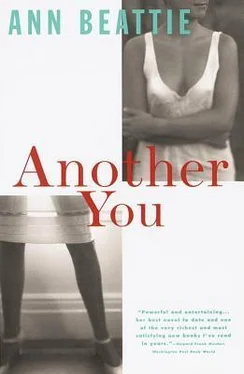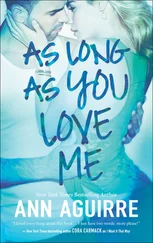Ann Beattie - Another You
Здесь есть возможность читать онлайн «Ann Beattie - Another You» весь текст электронной книги совершенно бесплатно (целиком полную версию без сокращений). В некоторых случаях можно слушать аудио, скачать через торрент в формате fb2 и присутствует краткое содержание. Год выпуска: 2014, Издательство: Vintage Books, Жанр: Современная проза, на английском языке. Описание произведения, (предисловие) а так же отзывы посетителей доступны на портале библиотеки ЛибКат.
- Название:Another You
- Автор:
- Издательство:Vintage Books
- Жанр:
- Год:2014
- ISBN:нет данных
- Рейтинг книги:5 / 5. Голосов: 1
-
Избранное:Добавить в избранное
- Отзывы:
-
Ваша оценка:
- 100
- 1
- 2
- 3
- 4
- 5
Another You: краткое содержание, описание и аннотация
Предлагаем к чтению аннотацию, описание, краткое содержание или предисловие (зависит от того, что написал сам автор книги «Another You»). Если вы не нашли необходимую информацию о книге — напишите в комментариях, мы постараемся отыскать её.
Another You — читать онлайн бесплатно полную книгу (весь текст) целиком
Ниже представлен текст книги, разбитый по страницам. Система сохранения места последней прочитанной страницы, позволяет с удобством читать онлайн бесплатно книгу «Another You», без необходимости каждый раз заново искать на чём Вы остановились. Поставьте закладку, и сможете в любой момент перейти на страницу, на которой закончили чтение.
Интервал:
Закладка:
Cheryl
He looked at the corner of the room, and out the window, familiar with the sameness of what he looked out on, yet still hoping for something: a group of students passing, a car driving through campus, Llewellyn’s black dog in the snow. “So much depends upon a red wheelbarrow” went through his mind — a line of poetry he had probably first read when he was Cheryl Lanier’s age, the meaning of which escaped him even as it stopped him dead. So much depends upon what? he thought now. What does it depend on? That people make confessions and provide you with new understanding? Or that you look high up into the corner of your office and see the dusty remains of what must have been an inefficient spiderweb — that you take pride in being more farsighted than your myopic middle-aged colleagues . So much depended on making eye contact with your fellow man, in this case Sophia Androcelli, who clearly had read every word of Cheryl’s letter, who had become his accuser though her friend Cheryl had not. How would she not be upset with him if she knew he’d kissed her friend in a car? Jealousy, perhaps. High-mindedness. A lack of sophistication about the way things were. All that was left to him was to move his eyes to hers, to see if the situation was impossible, or if there might be a chance he could present his case.
“I’ll tell you what she said when she gave me her notebook,” Sophia said quietly. “She said, ‘I wasn’t totally honest. He deserves to know the way things really are. He’s got his problems, but he’s basically a very kind person.’ So I end up the messenger for her note, delivered to a guy on the make who isn’t worthy of her compassion. Your weariness. Tell me about it,” she said, picking up the backpack, standing, and walking past him.
When she was gone, he looked back to the spider’s web for any missed signs of life, wrinkling Cheryl’s missive the way he’d once ruined schoolboy drawings he ran out of school with, taking them proudly to Evie, the same way he’d pressed the life out of lecture notes his thumb worried into blurred lines of type, practicing some difficult new lecture by reciting it silently the night before he intended to give it, walking back and forth in his living room. His living room. His bedroom. The smeared blood in the hallways.
Okay: now it was known that Cheryl Lanier, for reasons of her own, had intentionally or unintentionally added her own unpleasant experiences to Livan’s, thereby fuelling Livan’s fury. Not the end of the world, but certainly worth factoring in. Though it was not pleasant to acknowledge that the world could be such a terrible place that well-intentioned Cheryl could at one point in her young life have been exploited by a man assumed to have her best interests at heart. What if he either rushed after Cheryl or paid a hospital visit to McCallum, to tell McCallum what Cheryl had told him — what if, instead of being made to feel guilty because he’d been compromised, he asserted his control over the situation by standing firm and insisting that enough was enough, that henceforth he was entitled to a private life, that he would not willingly accept other people’s projections, that he had a right to his former life, that he was entitled to peaceful domestic tranquillity.
In that state of mind he shuffled some sheets of paper on his desk and looked at the telephone, dialled information, dialled McCallum’s hospital, reached the switchboard, and was finally connected with patient information. In a pleasant, calm voice, the woman who answered the telephone told him that no information was available on the patient he was inquiring about. “That’s NOS, sir. Although the patient is at the hospital, we are not provided with information, ourselves, about his condition.” What kind of an answer was that? “It’s marked NOS, sir; it’s not on the screen, at someone’s request. Perhaps the family. The doctor.” He thanked her and hung up. Perplexed, he stared again at the spider’s web without really focussing, brought his eyes back to the piece of paper. That long night of conflict seemed long ago. To remember it tired him physically, as if the episode existed concretely and he had brought it down on his shoulders like a boulder he should not have reached for. Should not, should not: Wasn’t it the new accepted groupthink that people give up thinking in terms of what they should or shouldn’t do and think, instead, originally? If so, what original thoughts might he have had? Perhaps a bit like thinking of a snappy rejoinder a day late, and yet he was tempted by his little challenge to himself. One answer might be that he could have turned his back on the situation. Or even that, setting out, he might have changed course, followed the car full of kittens being jostled about. He could have turned his life into an existential errand, an amusing bit for a farcical movie on the subject of middle-aged angst. Without his phone call, was there even a remote possibility McCallum would have ended up at his house? If McCallum had always considered him his friend, then just maybe. But couldn’t he and Sonja have sent him on his way, wouldn’t the drama have been diffused by sending him home after a brief conversation, and if he’d gone home, would his wife have become so enraged? Still, he did not feel personally guilty about what had happened to McCallum. At the very least McCallum probably knew the woman was violent, knew — or should have known — enough not to deride her over the telephone, reporting on her irrational actions to the first person who happened to call. How peculiar it was: that you could just edge over into someone’s life, like a cat creeping through an open door, dashing in unseen, perhaps dashing out again, too, except that in place of the tinkling-bell collar of warning, McCallum had dangled words, and they had felt obliged to respond to them, to weigh them, and to consider them, instead of smacking their hands together and hurrying him out. McCallum had told a fascinating alternate account of what had happened between him and Livan Baker, and as he’d done it he’d been both in character and also enough out of character that the account had seemed convincing, much the way certain artists could pull things off, Marshall thought now — artists who’ll tell you the quickest way to attain verisimilitude is to improvise, not to translate exactly. McCallum could have gone on stage with his Bag Lady monologue. Of course this was not to say that he hadn’t told it the way it had happened, not to say the inherent awkwardness and the painful truths hadn’t registered on him so that now he could show them to others, as easily as touching ink and holding up his hands to prove where he’d been. An image of a dirty-palmed McCallum came to mind — wishful thinking, or a true insight? — McCallum as the archetypal boy with his hand in the cookie jar, McCallum as the member of a species tagged to trace its eating habits, its migratory patterns. Well, for all that, a bird’s wing could be tagged, some animal’s ankle banded, and presumably by tracking it, you would have information — but McCallum had only tagged himself, and with no one to watch, or at least with no one but a bag lady and the clearly unbalanced Livan. So here it was: so-called real life, which he’d analyze totally differently than he would a text. He looked again at Cheryl’s note and was surprised that he felt a little pang because not only the note, but also the slightly harried way it was written, let him know immediately that everything was heartfelt. The way her handwriting revealed that the writer was young — female handwriting, not male, though of course such things could only register privately; it would be anathema to reveal such politically incorrect assessments. If she was gone, so much the better. As he began the process of resuming his normal life, he could do without recriminations. He could also do without facing the guilt he felt — okay; he felt it — because, acting like a person younger than his years, he’d been too quickly taken in by overblown problems, found them perplexing and then compelling. He’d become a little tantalized by his increasing involvement, which he knew, deep down, had been tinged with another kind of curiosity — all right: sexual curiosity. And he’d known it before she wrote what she did about that moment in the car — that almost inconsequential moment that had registered on him as strongly as it had registered on her, the connection that defined a missed moment.
Читать дальшеИнтервал:
Закладка:
Похожие книги на «Another You»
Представляем Вашему вниманию похожие книги на «Another You» списком для выбора. Мы отобрали схожую по названию и смыслу литературу в надежде предоставить читателям больше вариантов отыскать новые, интересные, ещё непрочитанные произведения.
Обсуждение, отзывы о книге «Another You» и просто собственные мнения читателей. Оставьте ваши комментарии, напишите, что Вы думаете о произведении, его смысле или главных героях. Укажите что конкретно понравилось, а что нет, и почему Вы так считаете.












